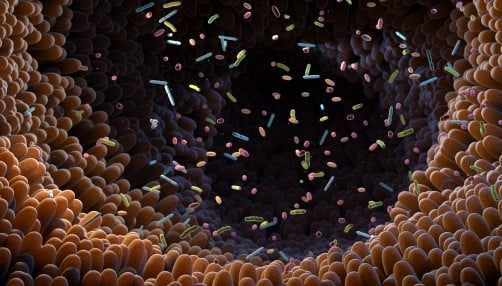Health
Study Links Babies’ Gut Bacteria to Future Emotional Health Risks

A recent study by researchers at UCLA Health has found a potential connection between a child’s gut microbiome and their emotional health later in childhood. The research indicates that the composition of gut bacteria in early life may influence the risk of developing conditions such as depression and anxiety during middle childhood. This study, published in the journal Nature Communications, highlights the critical role of gut health in emotional well-being.
The observational study focused on young children and identified a significant association between the presence of specific bacteria and the likelihood of experiencing internalizing symptoms, which include both depression and anxiety. Children whose gut microbiomes exhibited a higher abundance of bacteria from the Clostridiales order and Lachnospiraceae family were found to be at greater risk for these emotional difficulties. The researchers noted that this relationship appears to be indirect, operating through alterations in brain connectivity related to emotional processing.
Dr. Bridget Callaghan, the senior author of the study and an associate professor of psychology at UCLA, emphasized the implications of these findings. “By linking early-life microbiome patterns with brain connectivity and later symptoms of anxiety and depression, our study provides early evidence that gut microbes could help shape mental health during the critical school-age years,” she stated. The research suggests that if left unaddressed, symptoms of anxiety and depression could lead to more significant mental health challenges as children transition into adolescence and adulthood.
Prior studies on the gut-brain axis have primarily concentrated on infants and toddlers, often examining the relationship between microbial composition and early developmental milestones such as movement and language. In contrast, Callaghan and her team aimed to explore whether the gut microbiome’s makeup in early childhood could have lasting effects on mental health, particularly as depression and anxiety emerge.
The study utilized data from the Growing Up in Singapore Towards Healthy Outcomes (GUSTO) study, a longitudinal birth cohort project that gathered health data from children in Singapore. This included stool samples collected at age 2, resting state MRI brain scans at age 6, and behavioral data provided by caregivers at age 7 and a half years.
Researchers conducted a statistical analysis on data from 55 participants of the GUSTO study to identify brain connectivity patterns that correlated with internalizing symptoms. They subsequently examined the gut microbial profiles of these children at age 2 to determine how they related to the observed brain patterns. The findings revealed that the presence of bacteria belonging to the Clostridiales and Lachnospiraceae groups mirrored similar associations found in adult mental health studies, where these microbes have been linked to stress responses and depression.
Callaghan noted that while the study indicates a connection between gut bacteria and emotional health outcomes, further experimental research is necessary to confirm whether these associations are causal. “We need to figure out what species within these larger groups are driving the findings. Once we have that information, there are relatively straightforward ways to change the microbiome, like probiotics or diet, that we could use to address issues,” she explained. Callaghan is also affiliated with the Goodman-Luskin Microbiome Center at UCLA Health.
The research was conducted in collaboration with the Agency for Science, Technology and Research’s (A*STAR) Institute for Human Development and Potential, KK Women’s and Children’s Hospital, National University Health System (NUHS), and the National University of Singapore Yong Loo Lin School of Medicine.
As this field of study evolves, understanding the gut-brain connection could prove vital in developing preventative strategies for emotional health challenges in children, potentially paving the way for interventions that focus on early microbiome development.
-

 Science2 weeks ago
Science2 weeks agoIROS 2025 to Showcase Cutting-Edge Robotics Innovations in China
-

 Politics2 weeks ago
Politics2 weeks agoJudge Considers Dismissal of Chelsea Housing Case Citing AI Flaws
-

 World2 weeks ago
World2 weeks agoBravo Company Veterans Honored with Bronze Medals After 56 Years
-

 Lifestyle2 weeks ago
Lifestyle2 weeks agoStone Island’s Logo Worn by Extremists Sparks Brand Dilemma
-

 Health2 weeks ago
Health2 weeks agoStartup Liberate Bio Secures $31 Million for Next-Gen Therapies
-

 Top Stories2 weeks ago
Top Stories2 weeks agoIndonesia Suspends 27,000 Bank Accounts in Online Gambling Crackdown
-

 Health2 weeks ago
Health2 weeks agoTop Hyaluronic Acid Serums for Radiant Skin in 2025
-

 Sports2 weeks ago
Sports2 weeks agoMel Kiper Jr. Reveals Top 25 Prospects for 2026 NFL Draft
-

 World2 weeks ago
World2 weeks agoHoneywell Predicts Record Demand for Business Jets Over Next Decade
-

 Lifestyle2 weeks ago
Lifestyle2 weeks agoMary Morgan Jackson Crowned Little Miss National Peanut Festival 2025
-

 Sports2 weeks ago
Sports2 weeks agoYamamoto’s Mastery Leads Dodgers to 5-1 Victory in NLCS Game 2
-

 Politics2 weeks ago
Politics2 weeks agoNew Jersey Voters Urged to Register Ahead of November Election









